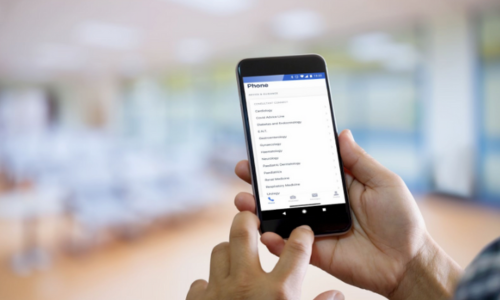NHSE’s latest single point of access (SPoA) guidance, to support winter resilience for 2024/25, acknowledges that many systems may already have implemented SPoAs in their local areas, but to varying degrees.
The guidance requires systems to meet the SPoA foundation components for winter 2024/25 with full case management to be implemented no later than March 2025.
Consultant Connect is the most experienced provider of fully managed SpoA in the UK. Our systems are relied on across England, Scotland and Wales, leading to improved outcomes for patients and better use of NHS resources.
Here are examples of how NHS areas in the UK are using Consultant Connect to meet the SPoA foundation components the guidance sets out:
1. Clear pathways in place for the provision of remote clinical assessment and advice through a SPoA prior to a decision to convey or attend ED
Simplifying single point of access via rapid and reliable Telephone Advice & Guidance improves patient outcomes and increases productivity. With Consultant Connect, clinicians can directly ‘hunt down’ a specialist consultant from a pre-defined rota for expert telephone advice. On average, 80% of calls are answered within 30 seconds, which means no time is wasted on busy switchboards or bleeps. In 2023, 53% of calls to SDEC lines resulted in the patient avoiding A&E/ED and instead being directed to the most appropriate place for their care.
Since 2016, primary care, community teams, and ambulance clinicians in South East London (SEL) ICB have used Consultant Connect as their SPoA to urgent care pathways. The service enables clinicians to call consultants directly at the touch of a button, with calls answered within 18 seconds (on average). In SEL ICB, 84% of calls have resulted in patients being navigated to A&E/ED alternatives.
2. Ambulance services enabled to identify patients prior to dispatch for alternative pathways, as well as adopting ‘call before convey’
Giving ambulance crews quick and reliable access to specialist teams is key to successful ‘call before convey’ pathway implementations. In Lanarkshire, for example, the Scottish Ambulance Service (SAS) use Consultant Connect to contact local A&E consultants when seeing patients with non-life-threatening conditions to discuss whether sending the patient to A&E is the best option. Calls to this pathway are answered within 4 seconds and often result in the patients being directed to a more suitable place such as specific units or providing self-care advice that allows them to bypass A&E departments.
In Lanarkshire, this has resulted in 65% of patients avoiding an unnecessary A&E admission, thus reducing the ever-increasing pressures in urgent care whilst improving patient care.
3. Direct referral pathways from SPoAs into community services such as UCR and Virtual Wards
It’s well known that for certain patients, such as frailty patients or those with respiratory conditions, a hospital admission for ongoing care needs isn’t always the best option. For these patients, being able to be cared for in the comfort of their own home via virtual wards/Hospital@Home pathways can be a game changer in terms of how quickly they recover.
In Buckinghamshire via Consultant Connect, a Frailty Hospital@Home (H@H) pathway was established in March 2023. Clinicians, such as GPs, nurses, community teams and specialists use Consultant Connect to refer suitable patients to the Frailty H@H pathway. To date 45% of patients have been identified as suitable candidates for the Frailty H@H pathway, meaning these patients are able to receive hospital-level care in their homes. This helps patients maintain independence, avoid hospital-related complications and means their recovery can be much quicker. In addition, it releases clinicians’ time and ensures they see patients in the most appropriate way whilst freeing up hospital beds for patients who need them the most.
4. Priority access to clinical advice for paramedics/ambulance staff and extending this in time to other health and care professionals, care homes, primary care (in-hours and out-of-hours GP services), community and other services
Ease of access to input from patients’ GPs is the most effective way to ensure patients (e.g. elderly or those with long term conditions) are treated in the community and stay out of hospital if it is safer to do so. GP Bypass Numbers can be added to the Consultant Connect service, enabling paramedics/ambulance teams to bypass queues of busy GP practice switchboards.
Across all of Wales, for example, all paramedics call GP Bypass Numbers for same-day emergency communications. 90% of calls are answered and resolved within 10 minutes, with 78% of these avoiding unnecessary patient conveyances and the patient being cared for at home or in the community.
If you would like to find out more about how Consultant Connect can strengthen your SPoA this winter and beyond, fill in our short form below or give us a call on 01865 261 467:
Related materials:
- Free Webinar | NHS vs Winter: Proven UEC pathways from across England, Scotland, and Wales
- Increasing operational resilience across the NHS this winter
- Consultant Connect Impact Report
- Urgent Care Pathways – Examples in Practice
- Meeting NHSE’s FRAIL strategy
- Helping you implement the SAMEDAY strategy to support SDEC pathways
